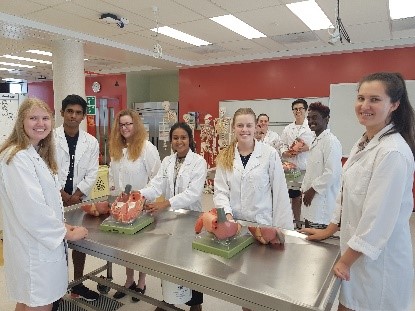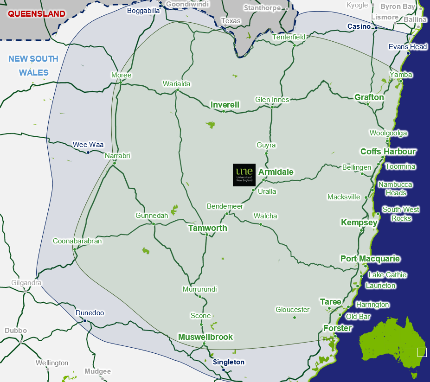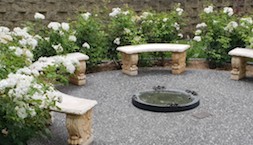Body Donor Program
Thank you for considering to donate your body to the school of Rural Medicine at the University of New England.
The UNE Body Donor Program has temporarily paused accepting body donors due to our program being at full capacity. The program intends to return to normal operation in January 2024. We sincerely apologise if this affects you or your loved one’s wishes. Your sincerely, The UNE Body Donor Program team. |
|---|
Contact details for the anatomy program:
Phone: (02) 6773 3087 (Press “1” for urgent matters and press “2” for general enquiries)
Email: anatomydonor@une.edu.au
Postal: School of Rural Medicine, University of New England, Armidale NSW 2351

Aim and Purpose
Your decision to donate will directly contribute to the education of the next generation of doctors, nurses, pharmacists and other allied health professionals. This is a unique gift which is invaluable for the students, trainees, clinicians and scientists who have the privilege of studying, learning and researching the anatomy of our generous local body donors.
The primary objective of the UNE Body Donor Program is to obtain human material for the purpose of teaching human anatomy to medical and other health science students. We also conduct research studies on human tissue to improve the knowledge of the scientific community, and practise surgical skills. Our students and staff marvel at the anatomical arrangements at the same time as having a reverence for the body donor’s gift of donation. We hope to give our students the best possible start to their anatomical, clinical and surgical education and training.
All use of our body donors’ tissue for teaching or research purposes is in keeping with the Anatomy Act 1977. The UNE Anatomy facility has been granted a Licence by NSW Health to conduct anatomical examination. All research is subject to approval from the University of New England’s Human Ethics Committee.
We endeavour to conduct ourselves using the highest possible standards for our registering donors and next of kin/executors. We understand that we may have very sensitive discussions and we hope to be compassionate and understanding of your needs.
The following information is correct as of July 2022 but is subject to change without notice.
The following provides information on the UNE Body Donor Program and includes instructions on how to register as a body donor. Step 1 – check eligibility To ensure you are first eligible for body donation, you will need to check through the list of terms of conditions of acceptance in the drop-down tab below, Step 2 – register If you seem eligible, complete the UNE Body Donor Program’s three registration forms and return them to the Body Donor Program. You can request these by calling (02) 6773 3087 or by emailing anatomydonor@une.edu.au Step 3 – notify relevant persons Ensure that your next of kin, executor of will, nursing staff, retirement community staff, and/or other relevant close persons are aware of your intentions to donate your body. There should be clear instructions for them to call our program on (02) 6773 3087 at your time of death, or as soon as reasonably possible. UNE prefers body donors to be at our lab within 15 hours of death, although we can accept body donors up to 48 hours post death as long as you have been stored in a mortuary cool room. Next of kin should also be aware that body donation is not guaranteed and final eligibility is determined at time of death. If you are admitted into a hospital, move to a retirement community, a nursing home, or any other type of care facility, it is recommended that a copy of the “Offer of Remains for Anatomical Examination” form be placed on your chart or care plan. Please ensure that your next of kin are aware of the duration of your donation. Four or eight years can feel like a long time before your ashes are returned to them. Should I include this in my will? It is recommended but not essential to include your wish to donate your body in your will. A statement in your will may declare (along the lines of): “After my death I wish, and consent to, my body being used for anatomical examination and for the removal of tissue from my body for teaching and research purposes and I confirm that my consent has not been withdrawn or revoked by me.” Please note that you are still required to register with the University, as described above. A statement in your will alone is not sufficient to donate your body. Upon death Before accepting your body, our staff will need to check to ensure it is suitable for donation. This includes talking with a nurse, doctor, or next of kin to check that your body is not restricted by the conditions of acceptance. [See tab below]. If your body is not accepted, your alternative arrangements should be carried out by your next of kin. Our UNE program will remove your personal details from all of our records, and your next of kin will not be contacted by us again unless they wish to contact us. If your body is accepted, our body donor program staff will coordinate transport and the retrieval of legal documents in order for us to receive the body into our program. Upon acceptance If your body is accepted, our staff will safely preserve/ embalm the body using formalin. Other methods may be trialed for research. For use Our anatomy staff and students may use your body to dissect, prosect (def: dissection with the intent of producing a high quality reusable educational specimen), practise surgical procedures, and affix organs/ tissues in clear, protective pots for permanent storage at UNE. Organs and tissues may also be tested for research. Will my family receive a report of the findings? No. Your body’s primary use at UNE is for it to be studied, appreciated and respected for its amazing anatomy – each body is a unique gift used to educate. We do not conduct autopsies nor do we provide any information on any post-mortem tests/ findings. Even after death, we treat your private and personal information with the utmost care for privacy and confidentiality (whether that be your name, phone number, or status of health conditions, etc). Upon completion of use Your body will be cremated – costs of cremation will be borne by the University. Your ashes may be scattered in the Piddington’s Memorial Garden overlooking Armidale, or returned to your next of kin depending on your preference as per Form 1. Any additional services should be arranged privately by your next of kin which would include associated costs. How long will the University keep my body? Under the Anatomy Act 1977, the University is legally allowed to originally retain your body for four years. With yours and your next of kin’s consent, and the approval of the NSW Department of Health, UNE may extend your donation for an additional four years (for a maximum of eight years) in order to make best use of such an educationally valuable donation. Am I eligible to donate? With the exception of people under the consenting age of 18, age is not a factor that we consider when accepting a body. Any willing person over the age of 18, who does not have any of the excluded issues below, may do so. The condition of your body when donating it to science is only restricted by infectious or neurodegenerative diseases and circulatory system blockages. Our students need to understand the body first in health, then in disease, so UNE accepts body donors who are both healthy as well as having diseases, disorders or other conditions (excluding those listed below). We can accept donors with conditions such as cancer, chronic cardio-vascular or kidney disease, diabetes, joint replacements, osteoporosis, arthritis, autoimmune diseases or people with ostomy bags – although bear in mind that these conditions may develop secondary issues (such as infection) making the body incompatible for donation. Incompatible conditions and circumstances: Advanced PVD and obstructions inhibit the embalming process. Blood-borne diseases pose a serious but preventable risk of transmission to staff/students. People with neurodegenerative disorders are restricted from donating because there may be a risk of transmission, but this is still being researched. If this makes you ineligible to donate your body, consider donating to a research institute, such as the Sydney Brain Bank, which studies neurological conditions in a safe and controlled environment. If you acquire the following conditions at time of death (or in the preceding weeks to months to death*): * the conditions below each hold their own level of risk and corresponding waiting period before donation would be acceptable – some 4 weeks prior to death, others 12 months The above conditions have been identified to reduce the risk of transmitting preventable diseases to our own staff and students. Complications such as Long Covid or Post-Polio Syndrome are fine for donation as long as the initial disease has been cured. However, some complications may make you ineligible in other ways – i.e. you may be prone to more infections, blood clotting or emaciation. Other circumstances before death that may make you ineligible: If you have resided in the UK for 6 months or more between 1980 and 1996. This is to reduce risk of transmission of vCJD (mad cow disease) which cannot yet be accurately diagnosed prior to death and presents a small but serious risk of transmission when handling neurological tissue. Emaciated and obese bodies are unsuitable for donation for a variety of reasons including ineffective embalming, reduced capacity to dissect and identify important anatomical structures, hazardous concentrations of embalming fluid, and unsafe lifting and loading capacities. Please speak to our Body Donor Program staff if you need further clarification. Coroner’s case Unexplained and unnatural deaths including deaths from accidents, suicide, homicide or suspicious circumstances like poisoning, are required by law to be investigated by a coroner and may include a post-mortem/autopsy. A coroner’s investigation is an important legal process to determine the cause of death. Unfortunately, the time it takes for this process to occur and for the results to be delivered means the body becomes ineligible for donation. Organ removal/ donation (or unhealed surgery) Please feel free to continue your registration with the organ donor program. However, should your organs be deemed suitable for transplantation at time of death, your body will become unsuitable for full-body donation as the embalming process becomes ineffective. As mentioned above, unhealed wounds from surgical operations are also contraindicated to body donation. Late notification of death The university must be notified as soon as reasonably possible. Notification should be within 24 hours of death, and accepting should be no later than 48 hours of death. If possible, the body should be at UNE within 15 hours of death to reduce possibilities of putrefaction, for effective embalming, and for reliable testing. Retraction of consent by next of kin It is extremely important to discuss your donation with your next of kin as they may not be comfortable with your decision to donate. If this is so, they may choose not to call the university, or call to say that they don’t want this to happen. Consent on behalf of all parties is a legal matter so please ensure your next of kin understands the process and are comfortable with you donating your body. Full storage capacity at UNE The UNE Anatomy lab is one of the smaller body donor facilities in Australia and New Zealand and, as such, our capacity to store bodies is limited. If we are not able to accept, there may be other programs willing to accept that we may refer you to. If this is not possible, your next of kin may have to proceed with your alternative after-death wishes. Unavailable staff (including Christmas period) UNE is limited by the availability of trained embalmers and a small anatomy staff team. Whilst our staff may be willing to accept on a typical weekend, the Christmas period and annual holidays may pose a greater barrier. It is always best to call as soon as possible to check if this applies. Final determination of the acceptability of a body for donation can only be made at the time of death, therefore it is imperative that you make alternative arrangements in the event that UNE is not able to accept. Our program currently accepts donors in a 4-hour driving radius from Armidale, although within 3-hours is preferred (see map below). Donors who pass away further than 300km or 3-hours’ drive begin to encounter logistical issues for donation. These issues may include unsafe and costly round-trips, but also a longer time to receive the body at UNE which may result in body deterioration. UNE’s program caters for one of the largest geographical catchments in Australia – unfortunately, our program does not have the need to warrant an even larger acceptance area. As you take a look at the map, we remind you that we may ask for the donor’s estate to assist with transport charges across the New England and Mid North Coast regions. To avoid undue grief and disappointment to members of your family, donors and their relatives must be aware of the circumstances described above. Where we have no option but to reject an offer, the next of kin or executor will become responsible for alternative arrangements. Does body donation cost anything? If body donation is suitable, UNE will assume all costs including preservation, storage, and cremation. UNE will also pay for transport within a reasonable distance, although UNE will invoice the donor’s estate if there are excessive transportation charges (including additional movements between the place of death and temporary storage locations or transporting long distances). If so, this will not exceed $1000. It will also continue to be your estate’s responsibility to pay for any formal death and cremation certificates as well as any private memorial services. Should you wish to contribute to the body donor program in a personal way including the donation of medical records, extended personal history, in-memorial letters, or art/craftwork relevant to anatomy or body donation, your charity would be most appreciated. Please contact our body donor program staff if you have an idea of meaningful contribution. Should you wish for you or your estate to cover more costs, to lend financial support to UNE research programs, or to donate towards memorialising our past and future body donors, please discuss this with our body donor program staff. Discussions and arrangements can be made between UNE and yourself/ your solicitor to amend your will to donate to UNE if this interests you. For more information on donating financially to UNE, please visit Give to UNE. Memorial services The University will hold a donor recognition/ memorial-appreciation service once every two years. Invitations and details of this ceremony are posted to the next of kin of current and past body donors for each ceremony. These ceremonies are typically held near the UNE memorial garden. These services are planned to offer our heart-felt thanks for your donation, and to acknowledge and thank your next of kin for supporting your wishes. Memorial book The UNE Body Donor Program has a custom-made papyrus memorial book which records the names of all of our body donors in professional calligraphy. This book is only on display at the memorial ceremony and only viewed by ceremony attendees.UNE Body Donor Program Information



